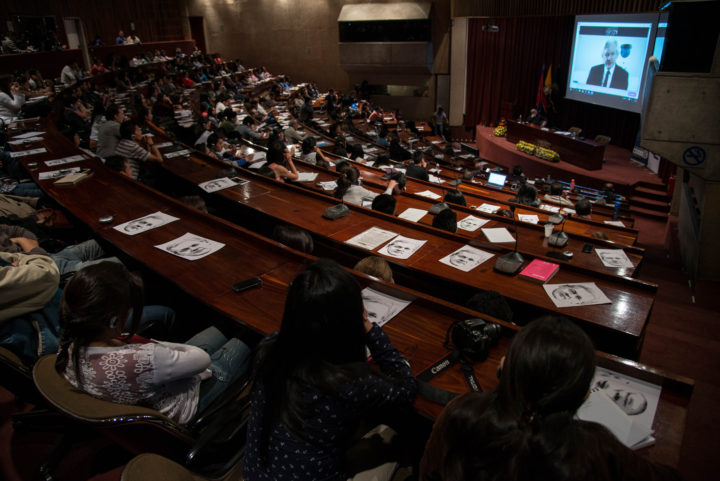Today, Julian Assange told average citizens to not be too scared at the prospect of online privacy being invaded at the event, “Julian Assange: 4 years of denied freedom” organised by International Higher Education Centre for Communication in Latin America, CIESPAL, in Quito Ecuador.
The founder of Wikileaks was addressing the conference via video conference from the Ecuadorian Embassy in London in a lecture on the subject of “From Wikileaks to the Panama Papers”. During the question and answer session at the end Assange responded to a question about whether ordinary citizens should take extraordinary measures to protect themselves from intrusion of their online privacy.
Assange, answered no, for a couple of reasons:
“Number 1 the united States and the United Kingdom has engaged in intense measures to try to prevent that happening, to pressure companies to not do that [implement encryption of their data] through the legal system, through parliamentary law and parliamentary debate, accusing those companies [that do so] of being traitors, putting people’s lives at risk.”
Secondly, Assange pointed out that despite the awareness of government surveillance which he and his colleagues have generated over recent years, this can lead to a fear of the kind induced by religions which is not healthy.
“I, Mr. Snowden and others, make a claim that there exists this invisible structure which is interfering in your life in some way and that you should be careful, and that you should do what we say to prevent the invisible structure from dominating your life and interfering with in it some way.
“This basically seems like it’s a religious claim. There exists this structure that can see everything you do, it’s omniscient, knows everything that goes on in your life and you must change your behaviour because if you don’t it will do something to you, will do something to your society.
“That’s like a claim about god, that there’s a new god in town, and this new god he can look into what you’re doing, he knows it all, he sees it all and if he doesn’t like what you do he can punish you.
“Now people are naturally resistant against those kinds of religious claims because they have been used for the last 5000 years to exploit people, to get them to do what they don’t want to do.
“I think it’s a hard problem when you’ve got an argument about something that’s invisible, so perhaps it’s not something that can be solved by a societal sentiment, by what people feel.”
He continued:
“This takes expertise and delegating this question to people with expertise, for example state intelligence agencies. They are assigned a role to protect the integrity of the state, to protect the people’s representatives from being spied on, from being manipulated, to protect companies from being spied on. That’s their professional role and they have to carry it out. That’s their job and when they fail they need to be punished and when they succeed they need to be praised.
“Similarly within companies and organisations key people are appointed to have that job. I think it’s a hard thing to have it in a public debate, and maybe not even good. Maybe it can be strongly counterproductive. If you tell everyone, look the United States has a massive machine intercepting billions of messages per day, including yours, it’s hacking everything and if you stand out it’s going to take action against you, to compromise your life in some way, and if there’s no easy way to fix the problem, there’s nothing easy you can do to stop it. What would people do?”
And the answer…
“Of course they will just change their behaviour to make sure they don’t offend the Empire in any way, to make sure they’re not friends with people who are offending the Empire. It will make people very conservative, it will make them lie in their conversations with their friends, to supress certain topics that they say publicly or they say privately, and that’s a terrible effect. It leads to conformism, to self-censorship with others and then eventually to the censorship of the mind.
“If you self-censor enough that becomes a habit, and eventually that habit gets into your thoughts and that’s the experience from very invasive states like the former East Germany, for instance. There was a very large secret police force and many informers. It’s estimated that up to 10% of the population had been informers at some stage of their life. Everyone starts to lie to each other and to themselves, to adapt to that.
“In Sweden the culture is actually in some ways similar to that because it’s very isolated, no one else speaks Swedish and there’s a very dominant arms industry so people are very frightened and they self-censor all the time. It becomes part of the culture.”
So, bearing all this in mind, Assange’s proposal is to carry on without worrying because otherwise you risk changing your behaviour and your way of thinking, making it even easier for Big Brother to control you…
“So I think we need to be very careful about putting fear into people without giving them a solution to that fear.
“I would say, don’t be too scared. Yes, it is a serious threat that intelligence agencies and computer programmers need to understand and to address but to the average person, don’t be scared. You should pretend that the problem doesn’t exist because unless you have a way of solving the problem, what you are going to do is you’re going to change your behaviour and that change in behaviour will lead to a lack of psychological and societal resistance. It will reduce your resistance and therefore the phenomenon will simply expand faster, and it has.”






